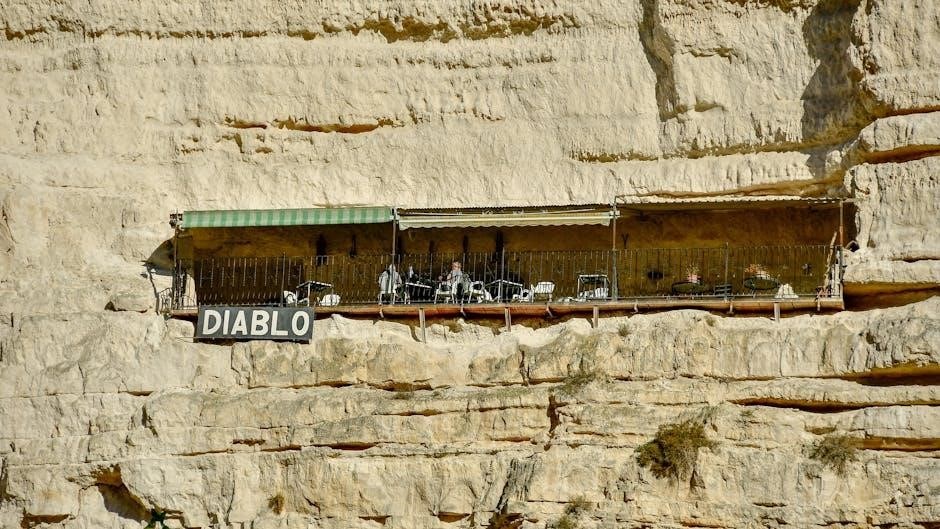Mi Alma Se La Dejo Al Diablo, a gripping narrative by Germán Castro Caycedo, unveils a haunting tale of a man’s final journey in the Amazon.
Overview of the Book and Its Author
Mi Alma Se La Dejo Al Diablo is a captivating work of narrative non-fiction authored by the renowned Colombian journalist Germán Castro Caycedo. Published in 1982, it marks his second major literary endeavor, following his successful debut in the genre. The book is centered around the poignant diary of a man who met his demise in the Amazonian wilderness, offering a profound exploration of human struggle and redemption. Castro Caycedo’s masterful storytelling weaves a tale that resonates deeply with readers, blending historical context with personal narrative. His reputation as a meticulous researcher and compelling writer shines through in this work, making it a significant contribution to Colombian literature.
Background and Publication Details
Mi Alma Se La Dejo Al Diablo, published in 1982, is Germán Castro Caycedo’s second non-fiction work, capturing a man’s harrowing diary entries in the Amazonian wilderness.
Historical Context and Significance of the Book
Mi Alma Se La Dejo Al Diablo, published in 1982, is a pivotal work in Colombian literature. Authored by Germán Castro Caycedo, it captures the raw essence of human struggle and isolation. The book is based on the diary of a man who perished in the Amazon, offering a haunting reflection of survival and despair. Its significance lies in its unflinching portrayal of the Amazon’s unforgiving environment and its impact on the human psyche. Castro Caycedo’s journalistic precision brings authenticity to the narrative, making it a compelling exploration of redemption and loss. The book remains a powerful commentary on the fragility of life in one of Earth’s most hostile yet majestic regions.

The Plot and Central Narrative
Mi Alma Se La Dejo Al Diablo centers on the diary of a man who perished in the Amazon, chronicling his descent into despair and ultimate redemption.

Exploring the Diary of a Man in the Amazon
Mi Alma Se La Dejo Al Diablo delves into the poignant diary of a man abandoned in the Amazon, revealing his anguish and introspection. The diary, a central narrative, captures his final moments, offering a raw glimpse into his psyche. Through his writings, the man grapples with isolation, regret, and the vast, unforgiving jungle. Castro Caycedo masterfully weaves the diary’s fragments into a compelling story, blending personal struggle with the haunting beauty of the Amazon. The diary becomes a testament to human resilience and the search for meaning in the face of despair, resonating deeply with readers.
Themes and Symbolism in the Book
Mi Alma Se La Dejo Al Diablo explores themes of redemption, isolation, and human struggle. The Amazon represents despair, while the diary symbolizes a desperate plea for salvation.
Analysis of the Struggle and Redemption
The book delves into the profound struggle of a man abandoned in the Amazon, chronicled through his diary. His final words, “Mi alma se la dejo al diablo,” reflect despair and resignation. The narrative explores themes of isolation, survival, and the search for meaning in the face of death. Through his journey, Castro Caycedo portrays the human spirit’s capacity for resilience and the quest for redemption, even in the darkest moments. The Amazon serves as both a physical and metaphorical backdrop, symbolizing the abyss of human suffering and the elusive hope of salvation. The diary becomes a confessional, revealing the man’s inner turmoil and his ultimate surrender to fate.

Accessing “Mi Alma Se La Dejo Al Diablo” in PDF
The book is available in PDF format for download through various platforms, offering readers convenient access to Germán Castro Caycedo’s poignant narrative.
Legitimate Sources for Downloading the Book
Mi Alma Se La Dejo Al Diablo is available for download in PDF format through reputable platforms like Casa del Libro Colombia and other authorized bookstores.
These sources ensure that readers access the book legally, supporting both the author and publishers. Avoid unauthorized websites to prevent illegal downloads and protect intellectual rights.
By purchasing or downloading from legitimate sources, readers contribute to the sustainability of literary works and respect the efforts of Germán Castro Caycedo.

Cultural Impact and Reception
Mi Alma Se La Dejo Al Diablo by Germán Castro Caycedo is a significant work in Colombian literature, deeply resonating with society and highlighting the nation’s struggles.
How the Book Resonated with Colombian Society
Mi Alma Se La Dejo Al Diablo deeply resonated with Colombian society by portraying the harsh realities of the Amazon and the struggles of its people. The book’s vivid narrative, based on a diary, offered a glimpse into the life of a man abandoned in the Amazon, striking a chord with readers. Its exploration of survival, isolation, and redemption mirrored the broader societal challenges faced by Colombians. The book’s ability to blend personal tragedy with universal themes of hope and despair made it a relatable and impactful work. It also sparked discussions about the nation’s history and its people’s resilience, further cementing its cultural significance.

Controversies and Criticisms
The book sparked debates over its portrayal of the Amazon’s harsh realities and the diary’s authenticity, with some critics questioning its dramatic tone and controversial conclusion.
Discussions Surrounding the Book’s Content
The book has ignited intense discussions about its vivid portrayal of survival and despair in the Amazon. Readers debate the authenticity of the diary entries, questioning whether they are factual or embellished. The graphic descriptions of isolation and the psychological breakdown of the protagonist have sparked conversations about humanity’s limits in extreme conditions. Additionally, the book’s exploration of guilt, redemption, and the clash between nature and civilization resonates deeply, prompting reflections on Colombian identity and the nation’s complex relationship with its natural resources. The diary’s haunting final phrase has become a focal point, symbolizing both surrender and defiance, leaving a lasting impression on readers worldwide.

Mi Alma Se La Dejo Al Diablo leaves a profound mark, blending raw emotion with a gripping narrative that lingers in readers’ minds long after the final page.
The Lasting Legacy of the Book
Mi Alma Se La Dejo Al Diablo has left an indelible mark on Colombian literature, captivating readers with its raw, emotional narrative. The book’s poignant exploration of human struggle and redemption resonates deeply, making it a timeless classic. Its vivid depiction of the Amazonian setting and the diary’s haunting final phrase have etched it into the collective memory of Colombian society. As a work of non-fiction, it bridges the gap between personal tragedy and universal themes, offering a reflective journey into the heart of darkness and hope. The book’s legacy endures, not only as a literary masterpiece but also as a testament to the human spirit’s resilience and the power of storytelling.
